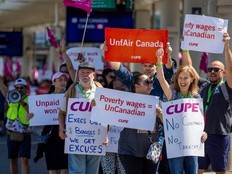PARKER: Why are Republicans having such problems doing what needs to be done?

Article content
Why is it such a struggle for Republicans to do what needs to be done regarding taxes and spending?
Let’s get to the root of the problem.
I began my work some 30 years ago with a passion to fix what was broken in our nation’s low-income communities. That is, to end the cycle of poverty — children growing up in poor households and remaining poor as adults.
I saw that what was widely accepted as the solution — America’s generous welfare state — was the problem.
It became clear to me that there is only one path out of poverty: A growing economy to create opportunity and citizens prepared, morally and physically, to participate and work.
President Bill Clinton, in his State of the Union address in 1996, announced “the era of big government is over.”
Major welfare reform was passed. Aid to Families with Dependent Children was replaced by Temporary Assistance for Needy Families, on which I consulted with Republicans.
When TANF was passed in 1996, federal spending as a percentage of gross domestic product (GDP) was a little over 19%.
When Clinton left office, it was down to 17.5% and federal debt was less than 33% of GDP.
I offer this as a backdrop to the “big, beautiful bill” with which the Republicans are now struggling.
Federal spending is now 23.5% of GDP and federal debt is 100% of GDP.
I note, once again, that the average real growth of the U.S. economy from 1950-1999 was 3.6% per year. From 2000-2024, it was 2.2% per year.
The Congressional Budget Office (CBO) projects that, by 2035, federal spending will reach 24.4% of GDP, debt 118% of GDP and growth will be down to 1.8%.
It is sufficient indication of how we have lost our way that it takes a book to even describe what is in the “big, beautiful bill.” The tax code has become a massive nightmare of complexity because it’s now a tool for social engineering and political favours rather than the vehicle through which we finance the legitimate functions of government.
Regarding spending, those who cower from making cuts in Medicaid should read my lips. If you care about the nation’s poor, let’s get our economy growing. And there is only one way to do this — less government and lower and simpler taxes. Furthermore, is it too much to ask able-bodied adults receiving federal welfare to work and put some money on the table toward their health-care costs?
And, if we’re going to be truthful here, let’s get it out loud and clear. How can Republicans claim credibility about wanting to deal with runaway government when the two single biggest government programs — Social Security and Medicare — are not even part of the discussion?
Per the CBO, in 2025, Social Security and Medicare will account for more than a third of the 23.5% that federal spending is taking from GDP. By 2035, per the CBO, Social Security and Medicare will consume 41% of federal spending.
The two largest federal programs, both with major fiscal problems, are not part of this discussion, and political leaders want to seem principled?
I ask every Republican to look in the mirror and ask themselves why they are serving.
Realize what I realized more than 30 years ago. Big government does not help, but hurts our poor. The way to help the poor is growth and the way to get growth is to get government out of the way.
Those who signed the Declaration of Independence concluded, “We mutually pledge to each other our Lives, our Fortunes, and our Sacred Honour.”
They courageously affixed their signatures, knowing war with the British Empire was inevitable.
The nation’s present and future are in great jeopardy. We have profoundly lost our way.
Those whose sense of mission is not aligned with the nation’s founders should seek a new line of work.
Star Parker is founder of the Center for Urban Renewal and Education











Postmedia is committed to maintaining a lively but civil forum for discussion. Please keep comments relevant and respectful. Comments may take up to an hour to appear on the site. You will receive an email if there is a reply to your comment, an update to a thread you follow or if a user you follow comments. Visit our Community Guidelines for more information.